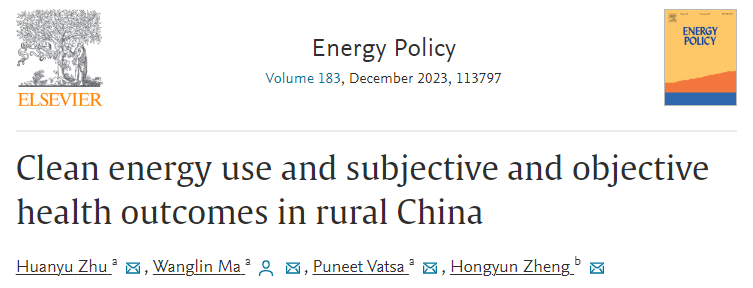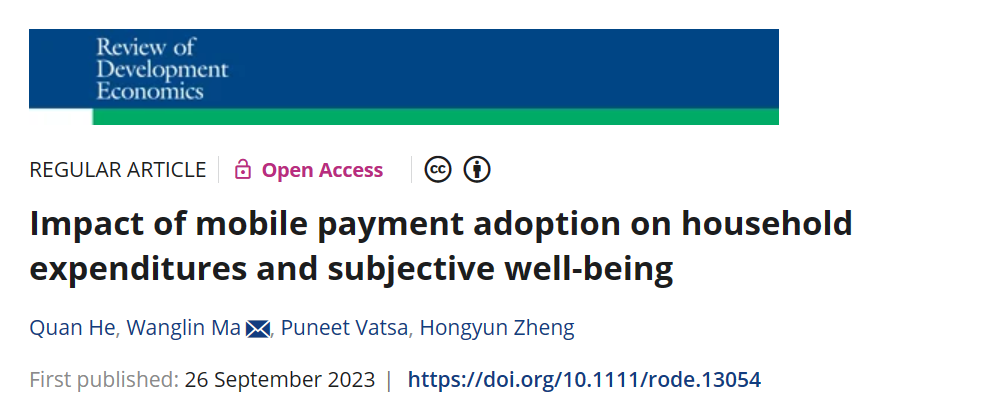近日,我院农林经济管理专业(中外合作办学)2016级毕业生朱环宇、何全(两人现皆为新西兰林肯大学硕士学位在读)在新西兰合作方林肯大学导师Wanglin Ma副教授指导下撰写的学术论文“Clean Energy Use and Subjective and Objective Health Outcomes in Rural China” 和 “Impact of mobile payment adoption on household expenditures and subjective well-being”分别在《Energy Policy》和《Review of Development Economics》期刊在线发表。《Energy Policy》由Elsevier出版, 是SSCI和SCI双检索的JCR一区期刊,2023年影响因子为9.0,在经济学国际刊物中排名前列(8/380)。该刊主要从经济、社会、规划和环境等方面探讨能源供应和使用的政策影响,是能源经济管理与政策研究领域的顶级权威期刊。《Review of Development Economics》由Wiley出版,2023年的影响因子是1.4。该刊主要讨论发展中国家当代增长问题的论坛,发表发展经济学方面的文章,是出版高质量发展经济学研究的领先期刊。
全文链接:


Abstract
This study analyses the impact of clean energy use on rural residents’ subjective health outcomes (self-reported health status, health change, and discomfort) and objective health outcomes (bronchitis, asthma, medical expenditure, and fitness expenditure). Using an inverse probability-weighted regression adjustment estimator and the 2018 China Family Panel Studies data, we address the selection bias associated with clean energy use and estimate the treatment effects. The empirical results show that farmers using clean energy (liquid gas, natural gas, methane, solar energy, or electricity) as the primary cooking fuel report improved health, a lower probability of physical discomfort, and higher fitness expenditures than non-users. Clean energy use does not significantly affect self-reported health, the probability of having bronchitis and asthma, or medical expenditures. The health effects of clean energy use on men differ from those on women; they also vary across different economic strata. We also find that farmers’ decisions to use clean energy are positively associated with their educational level, household income, whether they rent farmland, and their happiness levels but are negatively related to their age, family size, whether they own real estate, and the ratio of elders in their household.
Keywords: Clean energy use; Subjective health outcomes; Objective health outcomes; IPWRA
JEL Codes: I39; Q49; P18
摘要:本文分析了清洁能源使用对农村居民主观健康结果(自评健康状况、健康变化和身体不适感)和客观健康结果(支气管炎、哮喘、医疗支出和健身支出)的影响。利用逆概率加权回归调整(IPWRA)估计方法和2018年CFPS数据,本文控制了与清洁能源使用相关的选择偏差并估计了处理效应。实证结果显示,与不使用清洁能源的农村居民相比,使用清洁能源(液化气、天然气、甲烷、太阳能或电力)作为主要烹饪燃料的农村居民的健康状况得到了改善,身体不适的可能性更低,健身支出更高。使用清洁能源对自评健康状况、患支气管炎和哮喘发生的可能性,以及医疗支出没有显著的影响。使用清洁能源对男性和女性的健康影响不同,在不同经济阶层的影响也各不相同。本文还发现,农村居民使用清洁能源的决定与他们的教育水平、家庭收入、是否租用农田和他们的幸福水平呈正相关,但与他们的年龄、家庭规模、是否拥有房产和家庭中老年人的比例呈负相关。
全文链接:


Abstract
This paper estimates the effects of mobile payment adoption on household expenditures and people's subjective well-being. We consider four categories of household expenditures (that on clothes, durable goods, consumer goods, and cultural and leisure activities) and four indicators (life satisfaction, contentment, income satisfaction, and depression) of subjective well-being. We use the Augmented Inverse Probability Weighting estimator to analyze the 2017 Chinese General Social Survey data while accounting for the selection bias inherent in mobile payment adoption. The empirical results show that people's decisions to adopt mobile payment are positively associated with their educational levels, car ownership, social interaction, internet penetration rate, and residential location. Mobile payment adoption significantly increases household expenditures on consumer goods and cultural and leisure activities but not on expenditures on clothes and durable goods. Moreover, mobile payment adoption significantly decreases people's contentment while increasing depression. We also find that mobile payment adoption significantly decreases the contentment of urban people but significantly increases the depression of rural people.
Keywords: Mobile payment adoption; Household expenditures; Subjective well-being; AIPW estimator
JEL Codes: J33; P23; I31
摘要:本文估算了采用移动支付对家庭支出和人们主观幸福感的影响。我们考虑了四类家庭支出(衣着、耐用品、消费品和文化休闲活动支出)和四个主观幸福感指标(生活满意度、满足感、收入满意度和抑郁)。我们使用增强反概率加权估计器分析了 2017 年中国社会综合调查数据,同时考虑了移动支付采用过程中固有的选择偏差。实证结果显示,人们采用移动支付的决定与他们的教育水平、汽车拥有量、社会交往、互联网普及率和居住地呈正相关。采用移动支付会大幅增加家庭在消费品和文化休闲活动方面的支出,但不会增加在服装和耐用品方面的支出。此外,采用移动支付会大大降低人们的满足感,同时增加抑郁情绪。我们还发现,采用移动支付会明显降低城市居民的满足感,但会明显增加农村居民的抑郁感。
